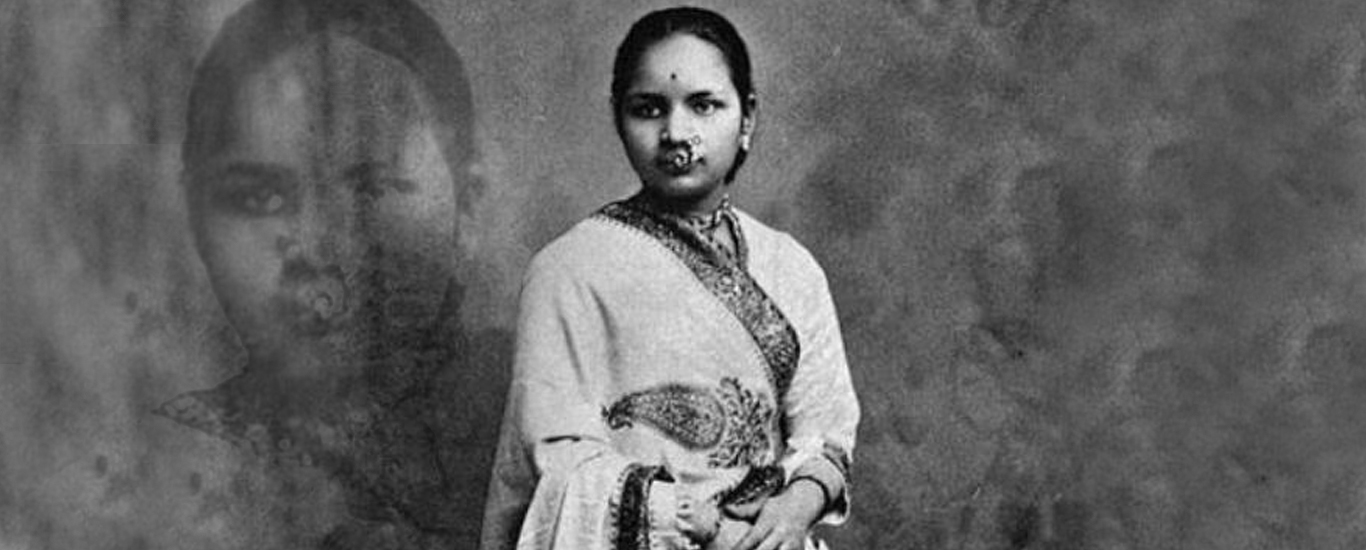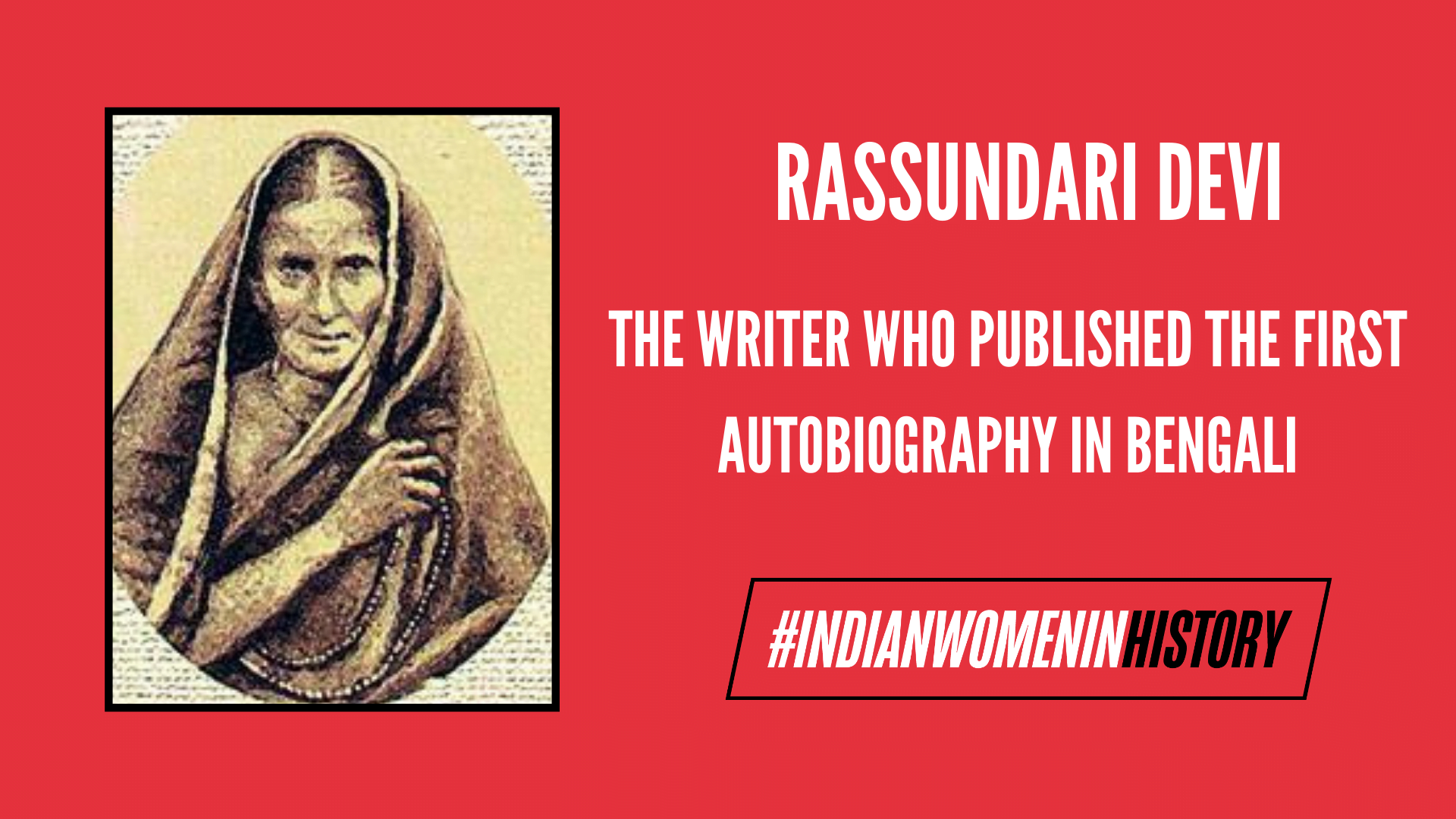Rashsundari Debi, born in 1810 in a small village in Potajia, Bengal is credited as the pioneer of autobiographical novel in the modern Bengali literature. Debi was never complacent with the existing social customs which embraced confinement and imprisonment of women within the four walls. She was a radical woman of her times who refused to abide by the traditional patriarchal beliefs and defied the patriarchal set up by reading, writing, critically analyzing the social practices of her times and putting out her life in the public sphere.
Rashsundari Debi, born in 1810 in a small village in Potajia, Bengal is credited as the pioneer of autobiographical novel in the modern Bengali literature. She was born in a rural zamindar family and raised entirely by her mother after her father’s untimely demise. In accordance with the prevalent traditions, she was married young (at the age of 12) and ventured out to habituate herself into a new region, new family, new culture and new life. Debi however could never be complacent with the existing social customs which embraced confinement and imprisonment of women within the four walls and romanticized the idea of servitude as the true path of salvation for the women in the society.

Her autobiography, “Amar Jiban” is testament of the vehemence with which she disregarded the gender roles set in society that not just ensured and advocated seclusion of women from public space by depriving them from accessing education but also demonized those who defied the norms and learned to read, write and think.
The primary reason she is labeled a “radical” or a non conformist can be attributed to the explicit nature of her writing that is a remarkable characteristic of her literary work.
“People put birds in cages for their own amusement. Well, I was like caged bird. I would have to ………. I would never be freed.” She also writes, “If I am asked to describe my state of mind, I would say it was very much like the sacrificial goat being dragged to the altar, the same hopeless situation, and the same agonized screams.”
Women’s writing….. 600 B.C. to early twentieth century.
The words and simile chosen by Rashsundari Debi to describe her mental state at the time of her marriage is indicative of the profound sorrow that is still fresh in her memories and left such an indelible mark that even after so many years, the pain has not mitigated. The life of subjugation and servitude marked by abandonment of passions, thrill, dreams and ideas at the tender age of twelve made her disregard the norm, rather the evil of child marriage. A life that the majority of women accepted as their eventual fate was portrayed as emotionally debilitating practice for a girl’s mind by progressively inclined Rashsundari Debi.
A God fearing woman, Rashsundari Debi did all household chores and made peace with her duties and conceded it as her lords’ wish but could never outgrow her desire to learn how to read. She wanted to engage with her creator not only through ceremonies and rituals but also at an intellectual level by reading religious scriptures. She detested that her gender identity had made her access to education an almost impossible task. She started feeling culpable of her ever growing desire to read but she could not accept her condition and one day found a way to start her education by stealing a page from Chaitanya Bhagvada and palm leaves to write alphabets.
She nonetheless, despised the old archaic patriarchal system which made her steal, lie and feel humiliated for a pious act of learning just because she was a woman. She nonetheless, through her unbreakable spirit and dedication taught herself to read, thus defying the exclusionary as well as discriminatory custom of her times. Moreover, the unusual part of her narration, which makes her a radical, is her attitude of making no bones about the misery that was inextricable to almost every woman’s life after marriage. She did not complain about her in laws for they were very kind. However, the duties and tasks that the women in the house had to finish were not just laborious but also left no room for personal care sometimes, even for daily meals.

Unlike many patriarchs in the field of literature, paintings and arts who celebrated womanhood and women by praising their submissive nature and describing, at length, the importance of women being devoted to the household duties and subservient to their male partner, She makes the reader realize that the “morning to night” grind a woman goes through to provide comfort to her husband and children should at least be acknowledged and appreciated, if not remunerated. “Instead of viewing labor in an aesthetic and romanticized way as male writers like Tagore tended to do, Rashsundari deconstructs the iconic figure of the housewife in Amar Jiban.”(Malhotra, 2016)
She seems regretful of the fact that her identity is entirely reduced to being a mother or wife who should take pride in her raising her children and serving her husband. Also, she does not shy away from mentioning how physically taxing it was for her to give birth to twelve children and fulfill the responsibilities that motherhood entails. Her statements, however should not be misconstrued as depiction of hatred towards her children and husband but an acknowledgement of the tiresome life (without unnecessary romanticization) of a woman engulfed in the care of children, husband, family, kitchen providing no time to take a breather and relax herself owing to her commitments.
Rashsundari Debi, through her writing, implicitly addressees the gender inequality which is trivialized and normalized in the patriarchal society. She was extremely close to her mother and considered her as a companion throughout her life. When her mother was on the deathbed and wanted to have her daughter by her side, she could not visit her as the long commute would require some pre arrangements which were unmanageable at the eleventh hour. Moreover, household work would suffer in her absence. She annoyingly states that her travel would never be so cumbersome, had she been a man. She repents her fate which has deprived her from attending her mother at the funeral pyre. She feels her life, a life of woman, is a curse. A woman is no better than a slave, a prisoner, a caged bird.
“Alas, my God, why did you let me born as a human being? It is indeed a very rare fortune to be born a human being. Birds and beasts are inferior beings. And to think of the sin I have committed even after being fortunate enough to be born a woman. Why was I ever born a woman? Shame on my life! but I am helpless. I am a caged bird.”
Women’s writing in India 600 B.C. to early twentieth century.
Rashsundari Debi was a radical woman of her times who refused to abide by the traditional patriarchal beliefs of the society which ensured its sustenance through systematic denial of means of liberation and emancipation to women in the society. She did not conform to the prevalent customs and strived to create her individual identity by educating herself. Rashsundari Debi, unlike the majority of women, defied the patriarchal set up by reading, writing, critically analyzing the social practices of her times and putting out her life in the public sphere, an act which itself deserves tremendous adulation.
Ashay Raj is a student pursuing Sociology Honours at Jamia Millia Islamia
Edited by: Gunjit Verma






GIPHY App Key not set. Please check settings